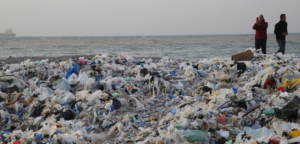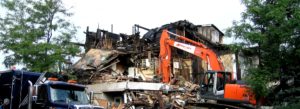Not everything should be put in a regular dumpster.
There are some items that should be recycled or disposed of in a dumpster. The things that you should not put in a regular dumpster include items like light bulbs, paint, cell phones, and electronics. These items can cause harm to those who’ll be working the dumpster and can cause problems in the landfill.
There are many ways to get rid of electronics. Many electronics stores will take your electronics, and if you’ve got your own recycling program at home, you can always just donate them to charity.
What Materials Aren’t Allowed In Dumpster Rentals
Hazardous Materials
There are many dangerous materials that the dumpster rental companies prohibit from being placed in roll-offs, such as chemicals, cleaning products and corrosive materials, and batteries.
Any paints, pesticides, herbicides liquid waste, fuel tanks, freon and neon light ballasts should also be included in this list. Corrosive, acidic, and paint thinner, stains, and varnishes are all on the banned substances list. If you don’t put it in the ground, it’s not likely to be allowed in a landfill.
Flammable Materials
You don’t want to start a landfill fire by dumping flammable liquids like gasoline. However, there may be additional combustible elements present on a workplace. When in doubt about the flammability of a chemical dumpster, look for the flammable hazard symbol on it. Unknown liquids and chemicals should be treated as potentially hazardous or flammable whenever possible if there is any ambiguity.
Certain Building Materials
Building materials can contain hazardous waste (such as asbestos) that can’t be disposed of in regular trash bins. Other building materials, such as bricks and concrete, are normally permitted in your roll-off container, but weight limits apply.
There may be limits on how much concrete and brick you can throw away in a single pickup. Before placing your order, be sure to check with the rental business to learn about their policy and weight restrictions.
Infectious Or Medical Waste
Disposal of infectious garbage and medical waste is strictly prohibited in dumpster rentals. Needles, red bags, and sharps are examples of things that are obvious to look for, such as rags or cloths that have been contaminated with bodily secretions.
However, you may not be aware that drugs can also be classified as medical waste. Keep an eye out for anything that might be related with medical procedures. For environmental reasons, you don’t want them to end up in the trash.
Regular Household Garbage
There are rules and regulations at some roll-off trash companies regarding typical domestic waste, which includes food waste. You could face a fine if you dispose of food and domestic waste in roll-off dumpster. It is perfectly acceptable to use the usual municipal garbage collection containers if you need to discard moderate amounts of household waste and foods throughout the course of your project. If you expect to generate a significant food wastes, such as during a restaurant renovation, consult with your rental business about disposal options before proceeding.
Herbicides And Pesticides
Garden herbicides and home pesticides that have been applied should also be kept out of the trash can. While that may be tempting to toss away multiple cans and bottles that have accumulated over the years, this is not a good idea. These kinds of chemicals must never be thrown away in dumpster or domestic trash. Pesticides and herbicides contain toxic substances that, if released from landfill into surrounding environment, could harm the environment and water supplies.
Railroad Tie
Some types of wood can be disposed of in dumpsters, however railroad ties were generally not permitted. In most cases, railroad ties are treated with creosote, which serves as the wood preservative while also being a hazardous substance to handle. It is manufactured by distilling coal or wood into tar, and if it is not disposed of appropriately, it can be hazardous to human health and the environment. It has a high flammability and also classified as the probable carcinogen.
Industrial Drums
The industrial drums are frequently contaminated with dangerous chemical waste and byproducts. Some of these substances have recognised identities, but if a drum is labelled incorrectly, it is possible that they will not be identified at all. Industrial barrels are not permitted in dumpsters or landfills for the sake of public safety. It is necessary to hire a specialised garbage removal firm in order to properly dispose of these goods.



 Renting out one of your properties to good tenants can definitely be a lucrative way to earn some extra money,
Renting out one of your properties to good tenants can definitely be a lucrative way to earn some extra money, 